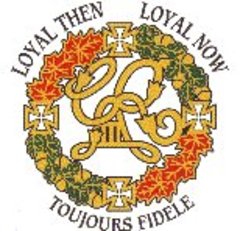I received this from a descendant of Joseph Haines, Jr.. The author, Pergrine Otway-Page was the son of Sarah, born 1814, died 1904.
"It was about the year 1776, after the loss of all their property because of loyalty to their King and Crown, that my ancestors on my mother's side were forced to migrate to Canada. However, it is uncertain from what part of the United States they came. They reached Canada after a long, dangerous journey of much suffering and privation. Arriving first at Fort Niagara and there resting a few days, they were transferred to Canada under the British flag.
The family consisted of my grandfather, the late Joseph Haines, his wife, four sons, Peter, Philip, Edward* and Joseph, and two daughters Sarah, my mother, and her sister, who afterward married a Mr. Whitney. When about one day's march from the frontier, Sarah who was but eight years of age, while bringing water from a nearby spring, was seized by two squaws and wrapped in their blankets and carried away. It was in the early evening after a whole day's weary travel, but her brothers pursued them and shot one when the squaws quietly let loose their little captive, and she was thus recovered in perfect safety. The same gun had been their protection upon other occasions during their escape to Canada, and I have it to this day in my possession in perfect order.
My grandfather, Joseph Haines, was granted 200 acres of land on the Four Mile Creek in the township of Niagara, His son Joseph was also granted 200 acres adjoining his father. Peter received his grant in the township of Ancaster, near Hamilton. Mrs. Whitney got her 200 acres on the Humber, and Sarah was granted 200 acres in Darlington twp. My grandfather, Joseph Haines, died at the Humber at the reported age of 130 years.
My father, Thomas Otway-Page, came to Canada form England in 1792. He was highly connected by blood, the eldest brother of the eminent Gen. Sir Loftus William Otway and Admiral Sir Robert Wiler Otway, but he attached his mother's maiden name Page on reaching Canada. In England he was a Tory and a fast friend of Gen. Maitland, afterwards Governor-General, but his fearless advocacy of free speech and equal rights to all caused a rupture with Gov. Maitland because he could not condone the outrage committed by the order of Sir Peregrine Maitland upon one Robert Randall under the form of the law. and also for having caused Mr. Forsyth's house to be tumbled into the Niagara River at Niagara Falls, and for which Sir Peregrine Maitland was recalled by the home government.
"My grandfather subsequently became a staunch Baldwin Reformer of influence. He was inofficiously educated and a man of wide and liberal views. My mother was a widow, Bland by name, with two children, Philip and Margaret, when my father married her in 1808. In the meantime my father had bought among other lands in Bertie lot B.F.L.E., Point Albino, which was granted in 1797 to one Timothy Skinner, a U.E. Loyalist, who had migrated from the States contemporaneously with the Haines family. My mother sold her grant in Darlington, and they moved to Bertie on Lot 32 B.F.L.E., where the family has always resided since 1808.
During the War of 1812 my father joined a detachment of the 89th Dragoons, to which he had belonged in England, and while he fought throughout the war with Captain Chambers in defense of his home, King and country, my mother looked after the farm, and she even prepared and wove the clothing from the flax worn by those on the farm, in addition to her household duties, etc., and was frequently obliged to ride to Niagara in the dead of night, a distance of thirty miles, on horseback.
During one of those nocturnal trips to Niagara, taken in the evening of the 12th of October, 1812, being about to leave Niagara towards morning, having just secured her countersign, she heard the battle of Queenston going on and shortly after saw Gen. Sir Isaac Brock and his aide-de-camp, Col. MacDonnell, ride away to the scene of action, to their fate. It was she who remarked that Gen. Brock had forgotten his sword, a very strange incident, but he refused to return for it and remarked that he had a presentiment that it would be his last battle, which subsequently proved only too true. She remained at Niagara until victory crowned ore arms, and in the evening of the same day she realized how dearly that victory had been bought when news reached Niagara that the mortal remains of Gen. Sir Isaac Brock and his faithful aide-de-camp were on the way to Fort George, where, in the presence of Gen. Roger Sheaffe, both bodies were laid to rest in one grave with the tears and sorrow of the whole country."
"In July 1814, my mother, having learned of the firing by the Americans of the village of St. David’s, promptly sent all her able-bodied farm servants to the seat of war, and the next day, the 25th of July, 1814, the terrible battle of Lundy's Lane was fought. She also sent her only son, Philip, who was but sixteen years of age, and he was orderly for Gen. Drummond during that day and night of carnage.
My mother garnered the grain with the help of small boys that summer, and with horses all disabled by the incidents of war. I was born the 22nd of August in the same year and was named after father's fast friend, Sir Peregrine Maitland. My father had his horse shot under him at Lundy's Lane, and received a musket ball in his thigh which he carried with him to his grave in 1832. Three of my uncles were at the battle of Sandwich under Gen. Brock, including my uncle Philip, who was burned to death in Toronto shortly afterwards.
My father belonged to Captain Chambers' company of fifty picked men. They were the terror of three hundred American frontier cow tails who were reputed to harass the inhabitants. They once took possession of our farm, and loaded nineteen wagons with all our grain, hay, provisions, etc., in the fall of 1814, and we were compelled that winter to pay $16.00 per barrel for our flour.
It was at this time, when I was but a few months old, they came near pelting me to death, sportively, with our fine golden pippen apples. They sacked our cellar, taking there from all our winter's meat, including four saddles of dried venison, and stole mother's carving knife, a relic she had brought from her home in the United States, but it was returned and is still in our possession in fair order. The soldier who took it was ordered by the captain to apologize to my mother for the theft, and was also reprimanded for using impudent language towards her."
"I can never cease to admire the resolute bravery of my mother, who in many respects was a most remarkable woman. While father was a large and powerful man, mother was small in stature, dark complexioned, with piercing black eyes, very small feet and small slim hands. Her hair was black as a raven, and so extremely long that she could stand erect on it trailing on the floor. A fearless rider on horseback, she was as resolute as she was active. One incident proves this; about 1822, a mischievous boy set fire to a cat, which dashed up a steep ladder into the garret of our house, where father kept his store of gunpowder covered with cotton waste. Smoke issued at once. I screamed fire to my mother, and she took a two pail bucket of water and ascended the ladder and extinguished the fire, but not until three of the hoops were burned off one of the powder kegs.
After the war, times began very much to improve. My father took a position as acting sheriff under Sheriff Hamilton for the united counties of Welland and Lincoln in 1816, and acted in that capacity until 1822, the family, with my mother at its head, remaining on our lands here, My father, however, commenced a business in Toronto shortly after 1828, and while attending to his business as storekeeper he died there in 1832.
In the meantime, he had left a kind old gentleman and a fast friend to our family on Point Albino, by name Dennis, under bond to dare for that part of our estate, and as it was useless for farming purposes, he subsisted chiefly by cultivating a few acres, fishing and netting pigeons. Mr. Dennis furnished us with barrels of salted pigeons on condition that I would not destroy his pigeon business by shooting them, and so expert did he become at pigeon-netting that he considered a take on one day of less than fifty dozen during the season a poor day. He often exceeded that number very much. This kind old man died in 1834, full of gratitude to our family. In the meantime I had grown from an infant hunter of four years of age with a pack of wolf-dogs that protected me from rattlesnakes and carrying a musket with flints, to an age when I should make it the rule to shoot off the heads of wild pigeons with my rifle."
"When I was about 10 years of age, our place being terribly infested with rattlesnakes, I was bitten by one in the top of my foot. This nearly proved fatal. It was many months before I recovered, and then I became subject to fits until I was 15.
The Rebellion of 1837 broke out when I was about 18 years of age. My mother, ever imbued with a martial spirit, advised me to turn out, which I did, and I was the second recruit to volunteer under Col. Kirby, leaving an eccentric philosopher named Brandyman, who had been my tutor from childhood, with my mother on the farm, and I was mainly instrumental in causing the volunteers to be armed with muskets, which were not at first issued to them. I had no trouble in instructing the recruits to shoot, for I was about as perfect a marksman in those days as could be found anywhere.
I was married in April, 1839, to Miss Magdaline Snider. She was a most dutiful wife and fond mother to my four children and her 19 grandchildren, but to our great sorrow and grief, she passed over to the majority in 1890, aged 75 years, regretted by all.
My mother died in 1852, full of years, aged 84, and she was laid to rest, by her special request, on the bank of Lake Erie, on Lot 32 B.F.L.E., overlooking Point Albino Bay, a most beautiful spot in front of a few garden acres which had been her delight to cultivate during her earlier years, but now for years overgrown with wild sweet balsams. This little plot had been consecrated as the burial-place of pioneers many, many years previous to 1852, and was made more sacred as the last resting-place of all that was mortal of one who was a noble heroine, and with all the attributes of the kindest mother."
* I haven't found any record for Edward or Peter, possibly a lapse of memory on the author's part. Children of record are : Philip, Joseph, Jr., Nathaniel, Sarah, Margaret and Mary upon arrival in Niagara. One son was killed in the Revolutionary war.
- Loyalist Claims for Losses #988
Blog Archives
- Bradt History (5)
- Doan Family (9)
- Haines History (74)
- Loyalist History (28)
- Miscellaneous (24)
- UELAC (2)

